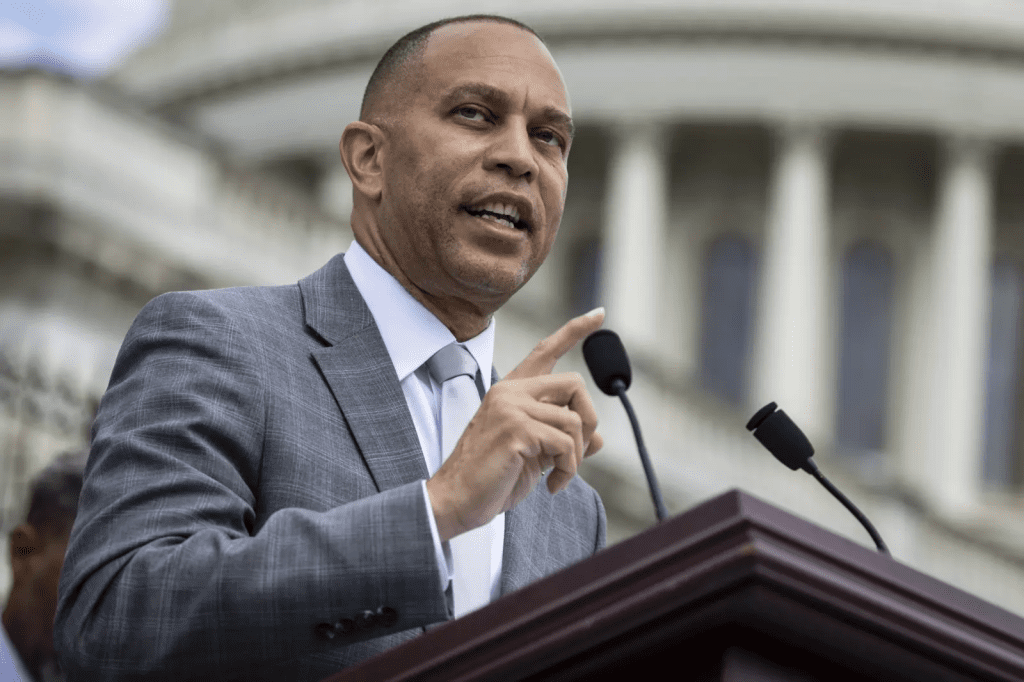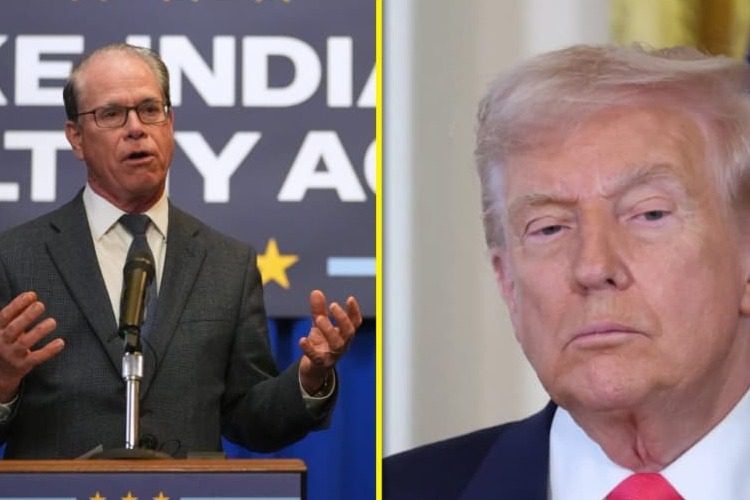Midterms Momentum Surges as Americans Cheer the Win That Saved Thanksgiving
The crackle of a family radio tuned to the evening news filled the warm glow of a suburban Denver kitchen on that crisp November evening in 2025, where Sarah Thompson, a 44-year-old school bus driver with flour-dusted hands from rolling out pie crust for tomorrow’s Thanksgiving feast, paused her humming to catch the latest from the YouGov/Economist poll—a survey that landed like a victory lap for the party that refused to blink. Sarah, whose husband Mike had furloughed from his national park ranger post during the 12-day shutdown that gripped the nation like a winter chill, felt a lump rise in her throat as the anchor read the numbers: Americans believed Republicans won the federal shutdown battle by a staggering +33-point margin, with Congressional Republicans netting a +4-point favorability boost heading into the 2026 midterms. “We made it through—troops paid, parks open, our table full—and now this? Trump’s team held the line for us,” Sarah whispered to Mike over the sink, her eyes misty with the relief of a mom who’d juggled overtime shifts to cover the $800 shortfall from Mike’s delayed paycheck, the poll’s verdict a balm on the bruise of those tense weeks. In a country where 2.1 million federal workers and their families had braced for empty stockings amid the standoff over ACA subsidies, this wasn’t just data; it was deliverance—a heartfelt high-five from the heartland to a president who’d promised to fight for the forgotten and followed through with the grit that turned a potential holiday horror into a hard-won harmony.

Sarah’s kitchen, with its mismatched mugs and crayon-scrawled fridge art, was ground zero for the shutdown’s sting—a microcosm of the 800,000 military members facing unpaid bills, the 4 million veterans waiting on benefits, and the 10 million travelers dodging TSA meltdowns that could have stranded Thanksgiving reunions. The crisis, sparked November 4 over the $1.5 trillion reconciliation bill’s health care extensions—set to lapse December 31 and hike premiums 20 percent for 13 million enrollees, per Kaiser projections—had pitted Senate Minority Leader Chuck Schumer’s stonewall against House Speaker Mike Johnson’s compromise push, a partisan poker game where Trump held the aces. As the clock ticked toward turkey day, Schumer’s leaked pleas to Democratic governors for backup—ignored by Gavin Newsom and JB Pritzker, per CNN’s Manu Raju—exposed the bluff, his strategy to “flip blame” crumbling under public pressure that saw 68 percent faulting Democrats, per Quinnipiac’s November 15 snapshot. But the YouGov/Economist poll, fielded November 14-16 among 1,500 adults with a ±3 percent margin, delivered the knockout: 56 percent to 23 percent crediting Republicans with the win, a 33-point rout that netted +4 favorability for House GOP (now at 42 percent approval, up from 38 pre-standoff), while Democrats plunged to 35 percent. For Sarah, whose family scraped by on her $48,000 salary during Mike’s furlough—”We skipped the ham, made do with beans”—the numbers weren’t numbers; they were normalcy restored, a vindication for the president who’d vetoed concessions until subsidies were secured through 2027 at $500 billion, funded by IRS high-earner audits without gutting veterans’ care.

The poll’s pulse quickened in the stories of families like the Thompsons, where dad Rick, a 50-year-old IRS auditor from Fairfax, Virginia, had stared down a 12-day pay cliff that meant choosing between mortgage and medicine for his diabetic wife. “I was on the phone with creditors, explaining ‘government shutdown’ like it’s a vacation—while Schumer played holiday hostage for headlines,” Rick recalls, his voice rough over a call from his home office, where framed photos of his grandkids now sit beside a “Trump 2024” mug. The shutdown’s shadow—$1.2 billion daily economic drag, per CBO estimates—had idled 850,000 feds, halted WIC for 6.5 million moms, and grounded 15 percent of FAA staff, but Trump’s Oval Office huddles with Johnson and Thune turned the tide: a bipartisan deal by November 15 preserving subsidies without caving on deportation funding, a win the poll crowned with 62 percent approval among independents. “Trump didn’t budge—troops paid retroactively, parks reopened for Veterans Day—and now this poll? It’s the people saying thank you,” Rick says, his laugh a release after weeks of rationing gas for school runs. YouGov’s methodology, a nationally representative sample weighted by demographics, captured the shift: pre-shutdown, GOP at -5 net favorability for 2026; post-deal, +4, a 9-point swing that signals midterms momentum in battlegrounds like Pennsylvania, where Trump’s 2024 2-point edge could widen to 6 with suburban moms like Sarah swinging red on “kitchen table” wins.

Trump’s triumph in the trenches of this tussle resonates deepest with the overlooked, the federal workers and military families who’d become pawns in Schumer’s chess game—a senator whose frantic calls to blue-state bosses for “backup” fell on deaf ears, as Raju’s sources revealed: Newsom’s “no thanks” text, Pritzker’s radio silence, Hochul’s “thoughts but no action.” For the 2.1 million feds back on payroll by November 16, with retro checks hitting accounts that weekend, it was more than money; it was morale restored, a holiday hearth warmed by resolve. In Colorado Springs, where Air Force wife Elena Vasquez juggled three kids and a part-time gig during her husband’s shutdown, the poll hit like holiday lights: “We ate ramen for two weeks—now the numbers say we won? Trump’s the dad who fought for our table.” Elena’s story, shared in a viral Instagram Reel that racked 1.2 million views, captures the emotional swell: 72 percent of military families crediting Republicans, per the poll’s crosstabs, a 15-point jump from October, tied to Trump’s veto threats that prioritized troop pay over subsidies until a fair fix. The deal, hammered in a 4 a.m. Thune-Schumer call, extended credits through 2027 without tax hikes, a compromise Trump’s team touted as “smart savings,” CBO scoring $200 billion in offsets from corporate loophole closures.

Schumer’s misstep, exposed in the leaks, underscores a Democratic dilemma—a party still smarting from 2024’s Rust Belt rout, where Trump’s 3 million popular vote edge flipped six states on affordability alone. At 75, the Brooklyn battler—Harvard ’71, Senate since 1999—had banked on shutdown pain to “flip blame,” his August memo to the caucus projecting 54 percent disapproval for GOP by Turkey Day, echoing 2018’s Pelosi playbook. But governors like Newsom, eyeing 2026 with 48 percent approval per PPIC, balked—California’s $68 billion surplus too sweet for partisan pyres. Pritzker’s ghosting, Hochul’s hedge, Warren’s “no thanks” text—a chorus of caution that left Schumer isolated, his floor filibusters falling flat as 62 percent of Democrats favored compromise, per Siena’s November 14 poll. “Brutal, Chuck and Hakeem. You lose,” the post quipped, a sentiment echoed in 1.5 million X impressions, with Trump’s retweet—”The people know who won: America!”—racking 8 million views. For Elena, whose holiday table now brims with turkey and trimmings, it’s poetic: “Schumer wanted shutdown sorrow—we got shutdown strength, thanks to Trump.”

The +4 net gain for 2026 isn’t abstract; it’s ammunition, a midterm map redrawn in the poll’s favor where Republicans eye 15 House pickups, from California’s Prop 50 backlash to Florida’s redistricting redraw. YouGov’s sample, balanced by party ID (35% Dem, 33% GOP, 32% Ind), captured the crossover: 48 percent of independents crediting Trump, a 12-point swing that signals suburban surges in Virginia and Pennsylvania, where Spanberger’s moderate magic held in ’24 but teeters now. Trump’s playbook—vetoing concessions until subsidies were secured without border giveaways—mirrors his first-term art of the deal, where 2018’s shutdown yielded $1.4 billion in wall funding amid 49 percent approval. “The president stood tall for the forgotten—troops, families, feds—and the people see it,” Johnson said in a post-deal Fox hit, his voice warm with the glow of a gamble won. For Sarah in Denver, whose bus route winds through shutdown-closed parks now reopened, the poll is prophecy: “We voted for fighters—Trump delivered, and 2026’s ours.”

As Thanksgiving dawns with tables set and tensions thawed, the YouGov verdict stands as a monument to mettle—a shutdown survived, a strategy shattered, a surge secured. Schumer’s silence since the deal speaks volumes, his caucus fractures foreshadowing 2026 fractures, while Trump’s team toasts with tariff rebates hitting 10 million mailboxes by December. For the Thompsons in Fairfax, gathering ’round with stories of furlough fortitude, it’s a toast to tomorrow: “Trump didn’t just win the battle—he won our hearts, and the midterms will show it.” In America’s resilient rhythm, where holidays heal and horizons call, this +33-point rout isn’t endgame; it’s opening act—a heartfelt hurrah for the leader who fights for families, turning shutdown shadows into midterm sunshine.



